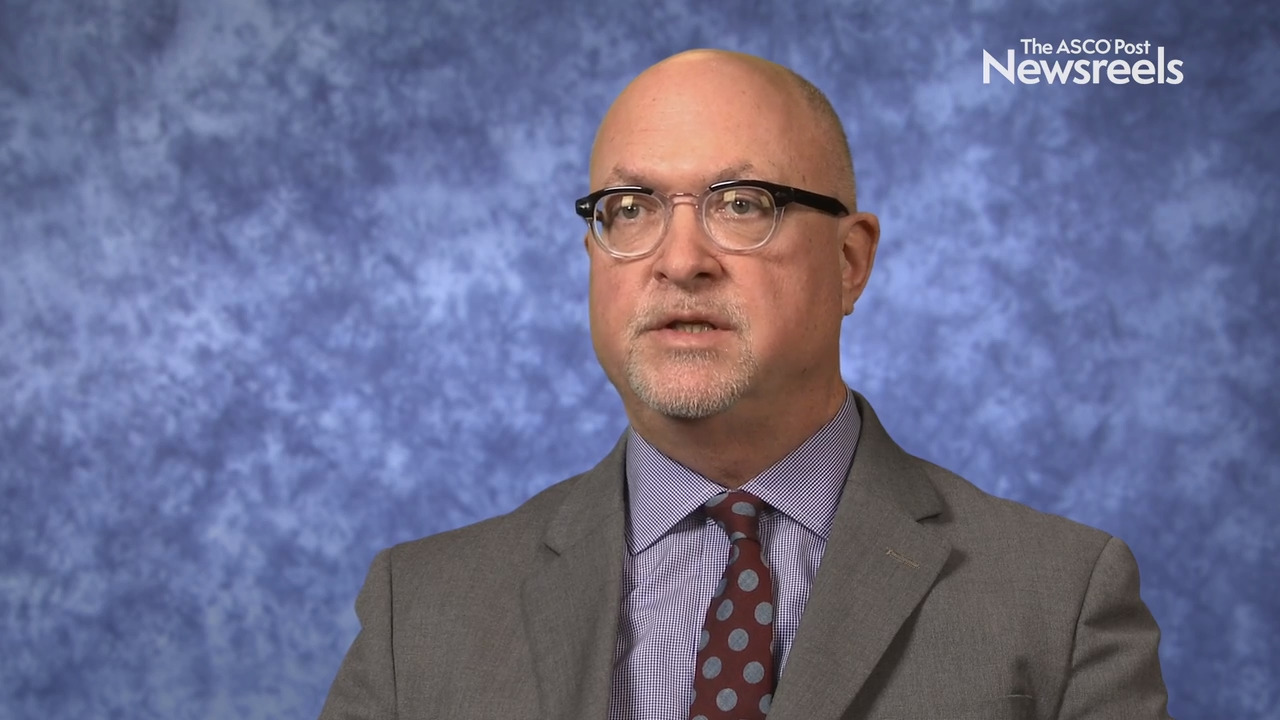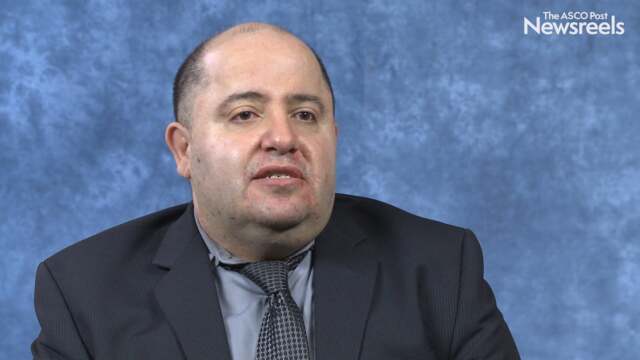David H. Ilson, MD, PhD, on Gastric Cancer: Results From the TAGS Study on Third-Line Trifluridine/Tipiracil
David H. Ilson, MD, PhD, of Memorial Sloan Kettering Cancer Center, discusses findings on the efficacy and safety of third-line trifluridine/tipiracil in patients with metastatic gastric cancer with or without prior gastrectomy (Abstract 3).
FDA Approves Biosimilar Trastuzumab-dttb
On January 18, the U.S. Food and Drug Administration (FDA) approved trastuzumab-dttb (Ontruzant), a biosimilar referencing trastuzumab, across all eligible indications—namely, adjuvant treatment of HER2-overexpressing breast cancer, metastatic breast cancer, and metastatic gastric cancer or...
2019 GI Cancers Symposium: Pembrolizumab in Second-Line Therapy for Advanced Esophageal Cancer
Pembrolizumab significantly improved overall survival in the second-line setting of advanced esophageal cancer in patients whose tumors tested positive for programmed cell death ligand 1 (PD-L1) with a combined positive score (CPS) of 10 or greater. This was compared to investigator’s choice...
2019 GI Cancers Symposium: Safety, Efficacy of Trifluridine/Tipiracil in Metastatic Gastric Cancer With or Without Gastrectomy
In a poster session earlier today David Ilson, MD, of Memorial Sloan Kettering Cancer Center, and colleagues reported on a preplanned subgroup analysis of the double-blind phase III TAGS study looking at the safety and efficacy of the oral agent trifluridine/tipiracil (FTP/TPI) in heavily...
2019 GI Cancers Symposium: Addition of Andecaliximab to mFOLFOX6 in Treatment-Naive Advanced Gastric or GEJ Adenocarcinoma
A phase I/Ib study found that the addition of andecaliximab, a monoclonal antibody that inhibits matrix metalloproteinase 9, to modified fluorouracil (5-FU), leucovorin, and oxaliplatin (mFOLFOX6) showed activity in gastric and or gastroesophageal junction (GEJ) carcinoma. Based on these...
EORTC-NCI-AACR: Dabrafenib Plus Trametinib Active in Some BRAF V600E–Mutated Gastrointestinal Cancers
In a late-breaking presentation at the 30th EORTC-NCI-AACR Symposium on Molecular Targets and Cancer Therapeutics, Zev Wainberg, MD, reported on results from a phase II international clinical trial of dabrafenib (Tafinlar) plus trametinib (Mekinist), which showed some activity in 36 patients ...
First-Line Immunotherapy Shows Benefit in Metastatic Colorectal Cancer Subset
In previously untreated patients with metastatic colorectal cancer and tumors demonstrating microsatellite instability–high (MSI-high) or mismatch repair deficiency (dMMR), immunotherapy with nivolumab (Opdivo) and low-dose ipilimumab (Yervoy) produced a durable clinical benefit in the...
Neoadjuvant Immunotherapy Yields Major Response in Colon Cancer Subset
In a small study of patients with early-stage colon cancer, neoadjuvant ipilimumab (Yervoy) plus nivolumab (Opdivo) produced major pathologic responses in 100% of patients with mismatch repair (MMR)-deficient tumors but in none of the patients with MMR-proficient tumors, researchers reported at the ...
FDA Pipeline: What’s New in Biosimilars, Drug Reviews, Designations, and More
The U.S. Food and Drug Administration (FDA) recently issued the following new approvals and designations: Approval for Pegfilgrastim Biosimilar The FDA recently approved a pegfilgrastim biosimilar, pegfilgrastim-cbqv (Udenyca). The biosimilar has been approved to decrease the incidence...
PERSIST-5: 5-Year Adjuvant Imatinib in Resected Intermediate- or High-Risk Primary Gastrointestinal Stromal Tumor
In the phase II PERSIST-5 study reported in JAMA Oncology, Raut et al found that 5 years of adjuvant imatinib therapy was associated with little risk of recurrence in patients with resected intermediate- or high-risk primary gastrointestinal stromal tumor (GIST). As noted by the investigators, 3...
Trifluridine/Tipiracil in Heavily Pretreated Metastatic Gastric Cancer
In the phase III TAGS trial reported in The Lancet Oncology, Shitara et al found that trifluridine/tipiracil (Lonsurf) significantly improved overall survival vs placebo in patients with heavily pretreated metastatic gastric cancer. In the double-blind trial, 507 patients with nonresectable...
Neuroendocrine Tumors: New Data, New Options
Because neuroendocrine tumors are not one disease but a continuum of diseases, ranging from well-differentiated tumors to poorly differentiated and small cell tumors, treatment approaches can vary greatly. At the 2018 Debates and Didactics in Hematology and Oncology conference, held on Sea Island,...
Maintenance Therapy for Metastatic Colorectal Cancer: Benefit Seen With Panitumumab Combination
Although the optimal approach to maintenance is not definitive in patients with metastatic colorectal cancer who have undergone chemotherapy-based induction with anti–endothelial growth factor receptor (EGFR) agents, the phase II VALENTINO trial showed that anti-EGFR maintenance therapy with...
Pertuzumab and Trastuzumab Plus Chemotherapy in HER2-Positive, Metastatic Gastric or Gastroesophageal Junction Cancer
As reported in The Lancet Oncology by Tabernero et al, the phase III JACOB trial showed no significant overall survival benefit of adding pertuzumab (Perjeta) to trastuzumab (Herceptin) plus chemotherapy in first-line treatment of HER2-positive metastatic gastric or gastroesophageal junction...
Ipilimumab in Combination With Nivolumab for MSI-H or dMMR Metastatic Colorectal Cancer
On July 10, 2018, ipilimumab (Yervoy) was granted accelerated approval for use in combination with nivolumab (Opdivo) for the treatment of patients at least 12 years of age with microsatellite instability–high (MSI-H) or mismatch repair–deficient (dMMR) metastatic colorectal cancer progressing...
MUC16 Mutation, Tumor Mutation Load, and Prognosis in Gastric Cancer
In a study reported in JAMA Oncology, Li et al found that MUC16 mutation was associated with increased tumor mutation load and improved prognosis in gastric cancer. The study involved analysis of genomic data from 437 gastric cancer samples from The Cancer Genome Atlas (TCGA; discovery set) and...
European Commission Approves Trastuzumab Biosimilar
The European Commission (EC) has approved Trazimera, a biosimilar to trastuzumab (Herceptin), for the treatment of human epidermal growth factor (HER2)–overexpressing breast cancer and HER2-overexpressing metastatic gastric or gastroesophageal junction adenocarcinoma. This approval...
Ability of Assay to Predict Response to Immunotherapy in Patients With Advanced Gastric Cancer
Researchers from Samsung Medical Center and Guardant Health, Inc have demonstrated the feasibility of determining a measure analogous to tumor mutation burden, a promising biomarker that may predict patient response to certain immunotherapies, utilizing the Guardant360 assay, a...
Second-Line Pembrolizumab vs Paclitaxel in Advanced Gastric or Gastroesophageal Junction Cancer
As reported in The Lancet by Shitara et al, the phase III KEYNOTE-061 trial showed no significant overall survival benefit with pembrolizumab vs paclitaxel in patients with advanced gastric or gastroesophageal junction cancer progressing on platinum-fluoropyrimidine treatment with programmed cell...
Optimizing Biologics in Metastatic Colon Cancer
Biologics are credited with increasing median overall survival in colorectal cancer to approximately 30 months. Their optimal use was discussed by Axel Grothey, MD, Professor of Oncology at the Mayo Clinic, Rochester, Minnesota, in an article he coauthored for the Journal of Oncology Practice 1...
Care for Colorectal Cancer Costs Twice as Much in Western Washington vs British Columbia, With Similar Survival
It is widely acknowledged that the costs of cancer care are much higher in the United States than in Canada, with outcomes that are thought to be similar. A new study presented at the 2018 ASCO Annual Meeting supports that view, by documenting and quantifying the differences in health-care costs...
Less Is More: No Benefit Reported for Hyperthermic Intraperitoneal Chemotherapy in Colorectal Cancer
With a growing emphasis on value in cancer care, some types of resource-intensive therapies may need to be reconsidered. One such treatment may be hyperthermic intraperitoneal chemotherapy, which showed no benefit during surgery for colorectal cancer confined to the peritoneum in the PRODIGE 7...
Risk of Gastrointestinal Cancers in Patients With Cystic Fibrosis
In a meta-analysis reported in The Lancet Oncology, Yamada et al found that patients with cystic fibrosis are at increased risk of gastrointestinal (GI) cancers vs the general population. Improved management of cystic fibrosis has led to increased life expectancy and increased incidence of...
Postoperative Chemotherapy vs Chemoradiotherapy in Resectable Gastric Cancer
In the Scandinavian phase III CRITICS trial reported in The Lancet Oncology, Cats et al found no benefit of postoperative chemoradiotherapy vs chemotherapy among patients with gastric cancer who had received neoadjuvant chemotherapy. Compliance with postoperative regimens was poor in both groups....
Anti–PD-1 Immunotherapy in Previously Treated Gastric Cancer
As reported in JAMA Oncology by Fuchs et al, pembrolizumab (Keytruda) showed activity in patients with previously treated advanced gastric and gastroesophageal junction cancer in the phase II KEYNOTE-059 trial. Study Details In the study, 259 patients from sites in 16 countries who had disease...
Antibiotic Therapy for Helicobacter pylori Infection and Prevention of Metachronous Gastric Cancer
In a Korean study reported in The New England Journal of Medicine, Choi et al found that antibiotic treatment for Helicobacter pylori was associated with a significant reduction in metachronous gastric cancer in patients who had undergone endoscopic resection of early gastric cancer or high-grade...
SSO 2018: Improved Survival With Nodal Downstaging in Gastric Cancer if ypN0 Is Achieved
A team of researchers led by Naruihiko Ikoma, MD, MS, of The University of Texas MD Anderson Cancer Center in Houston, analyzed outcomes in 316 patients with gastric cancer to determine whether patients who had clinically positive nodal disease before preoperative therapy have...
Triplet Therapy Poses a Triple Threat to BRAF-Mutated Colorectal Cancers
Triplet therapy that inhibits the BRAF, MEK, and epidermal growth factor receptor (EGFR) pathways appears promising in BRAF-mutated colorectal cancer, a malignancy that typically does not respond to BRAF inhibition alone. Early results from the BEACON CRC study showed a 48% response rate and an...
Studies Explore Colon Tumor Sidedness, Lung Radiation Dose in Esophageal Cancer, Pembrolizumab in Liver Cancer, and More
Along with full coverage of key presentations from the 2018 Gastrointestinal Cancers Symposium, The ASCO Post brings our readers this additional news roundup. Side Matters in Colon Cancer One of the studies included in the global IDEA trial, which compared 3 vs 6 months of adjuvant chemotherapy in ...
Lutetium Lu-177 Dotatate in Gastroenteropancreatic Neuroendocrine Tumors
On January 26, 2018, the radiolabeled somatostatin analog lutetium Lu-177 dotatate (Lutathera) was approved for the treatment of somatostatin receptor–positive gastroenteropancreatic neuroendocrine tumors, including foregut, midgut, and hindgut neuroendocrine tumors, in adults.1,2 Supporting...
Rehospitalization Patterns After Gastrointestinal Cancer Hospitalizations
In a study reported in the Journal of Oncology Practice, Manzano et al found that unplanned rehospitalization within 30 days after gastrointestinal (GI) cancer hospitalization was more likely after medical vs surgical index hospitalizations among older patients. Some risk factors for...
EXPERT POINT OF VIEW: Stephen Leong, MD
STEPHEN LEONG, MD, of the University of Colorado Comprehensive Cancer Center, Aurora, discussed the RAINFALL findings at the symposium, commenting, “The study did meet its primary endpoint of progression-free survival; however, it was disappointing not to see a benefit in overall survival or...
Ramucirumab/Chemotherapy in Gastric Cancer: ‘Positive’ Trial but Insufficient Benefit
BASED ON EFFICACY seen in the second-line setting for the treatment of metastatic gastric or gastroesophageal junction adenocarcinoma, ramucirumab (Cyramza) was evaluated as first-line therapy in the international phase III RAINFALL trial. Although the study met its primary endpoint, with a 25%...
FDA Approves Radiopharmaceutical for Rare Gastrointestinal Cancers
On January 26, 2018, the U.S. Food and Drug Administration (FDA) approved lutetium Lu-177 dotatate (Lutathera) for the treatment of gastroenteropancreatic neuroendocrine tumors (GEP-NETs). The drug is indicated for adult patients with somatostatin receptor–positive GEP-NETs. GEP-NETs can be...
Incidence of Noncardia Gastric Cancer Increasing Among Americans Under 50
A type of cancer that occurs in the lower stomach has been increasing among some Americans under the age of 50, even though in the general population, the incidence of all stomach cancers has been declining for decades. These findings were published by Anderson et al in the Journal of the National...
FDA Approves Lutetium Lu-177 Dotatate for Treatment of Gastroenteropancreatic Neuroendocrine Tumors
On January 26, the U.S. Food and Drug Administration (FDA) approved lutetium Lu-177 dotatate (Lutathera) for the treatment of gastroenteropancreatic neuroendocrine tumors (GEP-NETs). This is the first time a radiopharmaceutical has been approved for the treatment of GEP-NETs. Lu-177 dotatate is...
Nodal Stage Migration and Prognosis in Anal Cancer
In a study reported in The Lancet Oncology, Sekhar and colleagues found that the increasing proportion of lymph node–positive disease associated with enhanced detection techniques has led to nodal stage migration in anal cancer, which may reduce prognostic discrimination on the basis of lymph...
Maria Svensson, MD, PhD Candidate, on Esophageal and Gastric Cancers: Significance of PD-1 and PD-L1 Expression
Maria Svensson, MD, PhD Candidate, of Lund University, discusses high expression of PD-1 and PD-L1 in chemotherapy-naive esophageal and gastric adenocarcinomas, the implications for survival, and the link to a deficiency in mismatched repair genes (Abstract 9).
Manish A. Shah, MD, on Gastric Cancer: Results From the RAINFALL Trial
Manish A. Shah, MD, of Weill Cornell Medicine, discusses phase III study findings on cisplatin plus capecitabine or fluorouracil with or without ramucirumab as first-line therapy in patients with metastatic gastric or gastroesophageal junction adenocarcinoma (Abstract 5).
Florian Lordick, MD, on Gastric Cancer: Final Results From the AIO Trial
Florian Lordick, MD, of the University Medicine Leipzig, discusses study findings on intraperitoneal immunotherapy with the antibody catumaxomab for patients with peritoneal carcinomatosis from gastric cancer (Abstract 4).
Khaldoun Almhanna, MD, MPH, on Gastric Cancer: Results From the CCOG 1102 Trial
Khaldoun Almhanna, MD, MPH, of the H. Lee Moffitt Cancer Center, discusses the long-term outcome of a phase III study that explored the significance of extensive intraoperative peritoneal lavage in addition to standard treatment for ≥ T3 resectable gastric cancer (Abstract 1).
2018 GI CANCERS SYMPOSIUM: First-Line Ramucirumab in Gastric Cancer Improves Progression-Free but Not Overall Survival
The monoclonal antibody ramucirumab (Cyramza) was evaluated as first-line therapy for the treatment of metastatic gastric or gastroesophageal junction adenocarcinoma in the international phase III RAINFALL trial. Charles Fuchs, MD, of Yale New Haven Health in Connecticut, presented findings...
2018 GI CANCERS SYMPOSIUM: Cabozantinib Demonstrates Significant Overall Survival Benefit in Patients With Previously Treated Advanced HCC
Detailed results of the phase III CELESTIAL trial in patients with previously treated advanced hepatocellular carcinoma (HCC) were presented in a late-breaking oral session by Abou-Alfa et al at the 2018 ASCO Gastrointestinal (GI) Cancers Symposium (Abstract 207). Study Findings In CELESTIAL,...
2018 GI CANCERS SYMPOSIUM: KEYNOTE-224 Trial: Pembrolizumab in Patients With Advanced Hepatocellular Carcinoma Previously Treated With Sorafenib
Findings from the phase II KEYNOTE-224 trial investigating the use of pembrolizumab (Keytruda) in patients with advanced hepatocellular carcinoma who were previously treated with sorafenib (Nexavar) were presented by Zhu et al at the 2018 Gastrointestinal (GI) Cancers Symposium in San Francisco...
Study Finds Increased Risk in Common Cancers in Female Night Shift Workers
In 2007, the International Agency for Research on Cancer classified shift work with circadian disruption or chronodisruption as a probable human carcinogen. Now, a meta-analysis investigating whether long-term shift work increases the risks of common cancers in women has found that, overall, night...
Updated Data in KEYNOTE-061: Pembrolizumab in Previously Treated Gastric or Gastroesophageal Junction Adenocarcinoma
The phase III KEYNOTE-061 trial investigating pembrolizumab (Keytruda) as a second-line treatment for patients with advanced gastric or gastroesophageal junction (GEJ) adenocarcinoma did not meet its primary endpoint of overall survival (OS) (hazard ratio [HR] = 0.82, 95% confidence interval [CI] = ...
Update on Phase III JAVELIN Gastric 300 Trial of Avelumab in Pretreated Advanced Gastric Cancer
On November 28, Merck KGaA and Pfizer announced that the phase III JAVELIN Gastric 300 trial did not meet its primary endpoint of superior overall survival with single-agent avelumab (Bavencio) compared with physician's choice of chemotherapy. The trial investigated avelumab as a third-line...
Pembrolizumab in Advanced Gastric Cancer
On September 22, 2017, pembrolizumab (Keytruda) was granted accelerated approval for treatment of recurrent locally advanced or metastatic, gastric or gastroesophageal junction adenocarcinoma with tumors expressing programmed cell death ligand 1 (PD-L1), as determined by a U.S. Food and Drug...
Metastatic Gastric Cancer: Dual HER2-Targeting Study Does Not Meet Primary Endpoint
Dual HER2 targeting in metastatic gastric and gastroesophageal junction cancers did not significantly improve outcomes over trastuzumab (Herceptin) alone—both in combination with chemotherapy—according to the results of the phase III JACOB study reported at the 2017 European Society for Medical...
Adding Targeted Agent to Chemotherapy in Second-Line Treatment of Advanced Gastric Cancer
In the Asian phase III GOLD trial reported in The Lancet Oncology, Bang et al found that the addition of olaparib (Lynparza) to paclitaxel did not significantly improve overall survival among patients with previously treated advanced gastric cancer, including those with...





